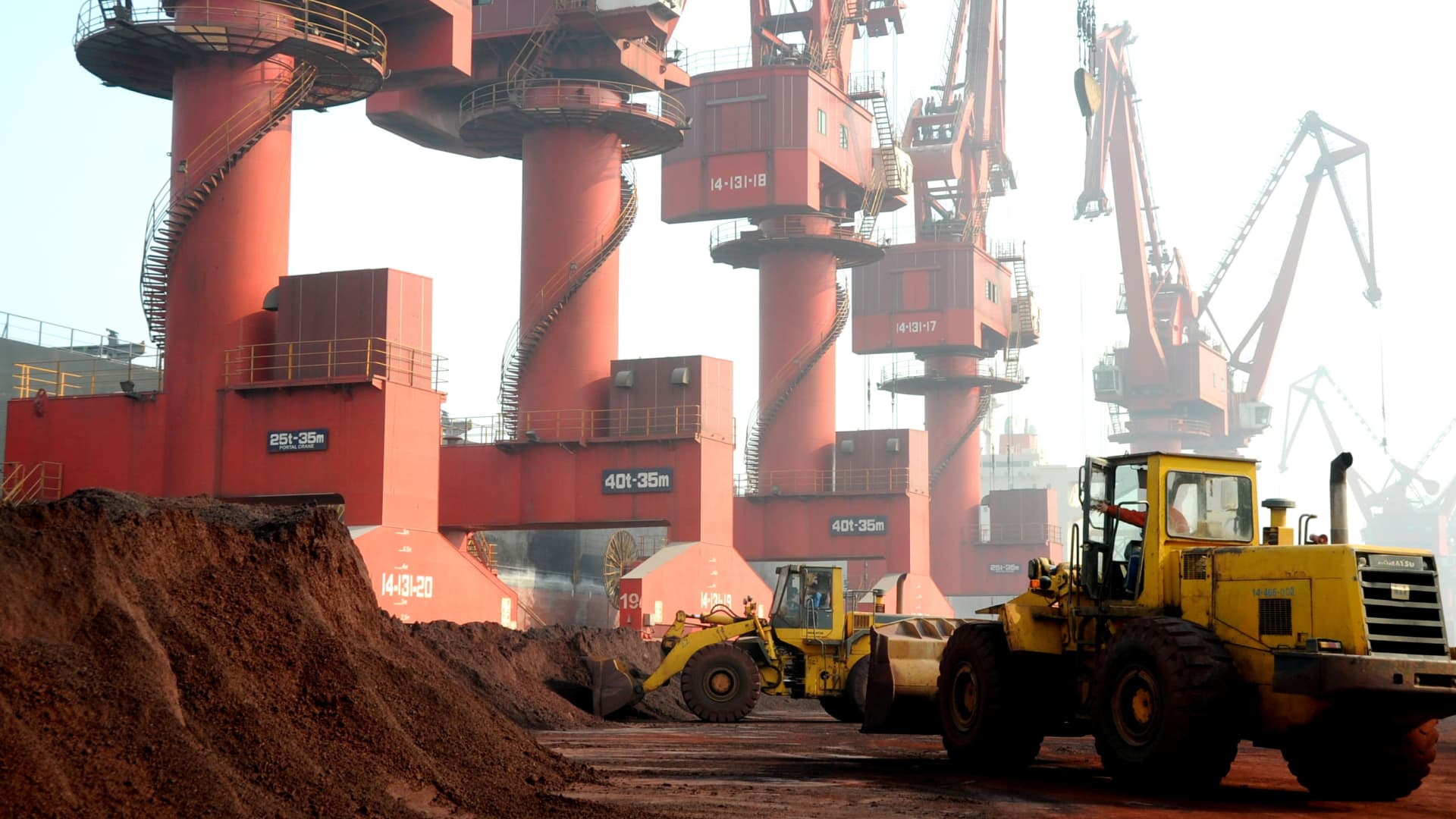Workers transporting soil containing rare earth elements for export at a port in Lianyungang, Jiangsu province, China, Oct. 31, 2010.
Stringer | Reuters
Automotive industry groups are increasingly worried about a rare earth shortage.
Several European auto supplier plants and production lines have already been shut down due to China’s recent export controls, according to Europe’s auto supplier association CLEPA, with the group warning of more outages as inventories deplete.
Germany’s car industry and auto executives have also sounded the alarm, saying the highly globalized sector is acutely vulnerable to further supply chain disruption.
China’s Ministry of Commerce in early April imposed export restrictions on several rare earth elements and magnets widely used in the automotive, defense and energy sectors. The curbs came as part of a response to U.S. President Donald Trump’s tariff increase on Beijing’s products.
Some of the affected rare earth elements are vital components to the production of both combustion engines and electric vehicles.
CLEPA said Wednesday that while hundreds of export license applications have been submitted to the Chinese authorities since early April, only around 25% appear to have been approved.
“With a deeply intertwined global supply chain, China’s export restrictions are already shutting down production in Europe’s supplier sector,” CLEPA Secretary General Benjamin Krieger said in a statement.
For its part, the German Association of the Automotive Industry (VDA), the country’s main car industry lobby, warned that Beijing’s export restrictions could soon cause output to grind to a halt.
“The Chinese export restrictions on rare earths are a serious challenge for the security of supply, and not just in the automotive supply chains. Although some licences have now been granted, this is currently not enough to ensure smooth production,” VDA President Hildegard Müller told CNBC via email.
“A further problem arises from the slow customs clearance of exports for which a valid export licence has been granted. If the situation does not change quickly, production delays and even production stoppages can no longer be ruled out,” she added.
Müller reiterated the VDA’s call for German and European Union lawmakers “to raise this issue emphatically with the Chinese side so that a solution to the situation can be found quickly.”
Vehicles are assembled on a line at the BMW plant in Leipzig.
Picture Alliance | Picture Alliance | Getty Images
Demand for rare earths and critical minerals is expected to grow exponentially in the coming years as the clean energy transition picks up pace.
China, meanwhile, is the undisputed leader of the critical minerals supply chain, accounting for roughly 60% of the world’s production of rare earth minerals and materials. U.S. officials have previously warned that this poses a strategic challenge amid the pivot to more sustainable energy sources.
‘We need to continue finding alternatives’
Germany’s BMW reportedly said Wednesday that some of its supplier network had been affected by China’s export curbs, while major domestic peers Volkswagen and Mercedes-Benz Group both said they were not experiencing any shortages.
“As a matter of principle, Mercedes-Benz has a strategy for all critical raw materials that are purchased directly and indirectly that secures demand in the long term and mitigates supply risks in the long term – knowing full well that raw material deposits are limited in some regions,” a Mercedes-Benz Group spokesperson said in an emailed statement.
The carmaker added that it was also working on concepts to “significantly reduce” the amount of rare earth metals per vehicle unit. “In the future, Mercedes-Benz wants to use new material compositions to dispense with heavy rare earth metals such as dysprosium in our electric drives,” they said.
A Volkswagen spokesperson told CNBC that the supply of auto parts containing rare earths was stable.
“Our suppliers are continuously working with their subcontractors to obtain the necessary export licenses. We have received indications that a limited number of these licenses have been granted,” they said.
A spokesperson for BMW did not respond to a request for comment.
Ivan Espinosa, chief executive officer of Nissan Motor Co., speaks during an interview at the company’s headquarters in Yokohama, Japan, on Thursday, May 15, 2025.
Bloomberg | Bloomberg | Getty Images
It’s not just European carmakers reckoning with a rare earth shortage.
Japan’s Nissan said it was also exploring ways to minimize the impact of China’s export controls by working with Japan’s government and the Japan Automobile Manufacturers Association.
“It’s something that is happening as we speak — and it is true that it will have some impact on the automotive industry,” Nissan CEO Ivan Espinosa told CNBC on Wednesday.
“We need to continue finding alternatives for the future, keeping flexibility and keeping our options open,” he added.
Japanese automaker Suzuki Motor suspended production of its Swift car due to China’s rare earth curbs, Reuters reported Thursday, citing two unnamed sources. A Suzuki Motor spokesperson was not immediately available to comment when contacted by CNBC.





